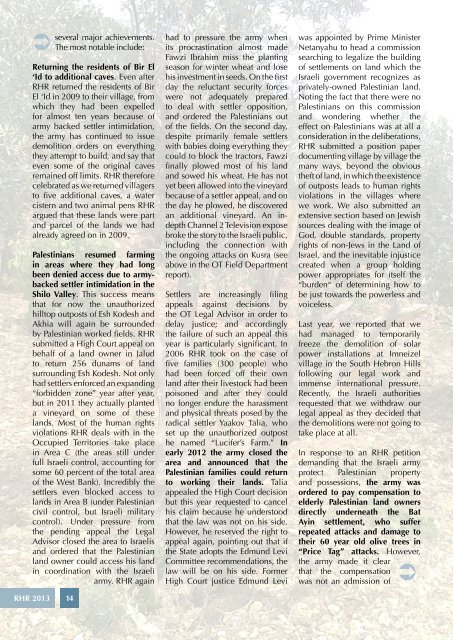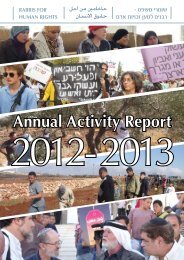Rabbis For Human Rights: The Annual Report 2012-2013
Rabbis For Human Rights: The Annual Report 2012-2013
Rabbis For Human Rights: The Annual Report 2012-2013
Create successful ePaper yourself
Turn your PDF publications into a flip-book with our unique Google optimized e-Paper software.
several major achievements.<br />
<strong>The</strong> most notable include:<br />
Returning the residents of Bir El<br />
‘Id to additional caves. Even after<br />
RHR returned the residents of Bir<br />
El ‘Id in 2009 to their village, from<br />
which they had been expelled<br />
for almost ten years because of<br />
army backed settler intimidation,<br />
the army has continued to issue<br />
demolition orders on everything<br />
they attempt to build, and say that<br />
even some of the original caves<br />
remained off limits. RHR therefore<br />
celebrated as we returned villagers<br />
to five additional caves, a water<br />
cistern and two animal pens RHR<br />
argued that these lands were part<br />
and parcel of the lands we had<br />
already agreed on in 2009.<br />
Palestinians resumed farming<br />
in areas where they had long<br />
been denied access due to army-<br />
backed settler intimidation in the<br />
Shilo Valley. This success means<br />
that for now the unauthorized<br />
hilltop outposts of Esh Kodesh and<br />
Akhia will again be surrounded<br />
by Palestinian worked fields. RHR<br />
submitted a High Court appeal on<br />
behalf of a land owner in Jalud<br />
to return 256 dunams of land<br />
surrounding Esh Kodesh. Not only<br />
had settlers enforced an expanding<br />
“forbidden zone” year after year,<br />
but in 2011 they actually planted<br />
a vineyard on some of these<br />
lands. Most of the human rights<br />
violations RHR deals with in the<br />
Occupied Territories take place<br />
in Area C (the areas still under<br />
full Israeli control, accounting for<br />
some 60 percent of the total area<br />
of the West Bank). Incredibly the<br />
settlers even blocked access to<br />
lands in Area B (under Palestinian<br />
civil control, but Israeli military<br />
control). Under pressure from<br />
the pending appeal the Legal<br />
Advisor closed the area to Israelis<br />
and ordered that the Palestinian<br />
land owner could access his land<br />
in coordination with the Israeli<br />
army. RHR again<br />
RHR <strong>2013</strong><br />
14<br />
had to pressure the army when<br />
its procrastination almost made<br />
Fawzi Ibrahim miss the planting<br />
season for winter wheat and lose<br />
his investment in seeds. On the first<br />
day the reluctant security forces<br />
were not adequately prepared<br />
to deal with settler opposition,<br />
and ordered the Palestinians out<br />
of the fields. On the second day,<br />
despite primarily female settlers<br />
with babies doing everything they<br />
could to block the tractors, Fawzi<br />
finally plowed most of his land<br />
and sowed his wheat. He has not<br />
yet been allowed into the vineyard<br />
because of a settler appeal, and on<br />
the day he plowed, he discovered<br />
an additional vineyard. An indepth<br />
Channel 2 Television expose<br />
broke the story to the Israeli public,<br />
including the connection with<br />
the ongoing attacks on Kusra (see<br />
above in the OT Field Department<br />
report).<br />
Settlers are increasingly filing<br />
appeals against decisions by<br />
the OT Legal Advisor in order to<br />
delay justice; and accordingly<br />
the failure of such an appeal this<br />
year is particularly significant. In<br />
2006 RHR took on the case of<br />
five families (300 people) who<br />
had been forced off their own<br />
land after their livestock had been<br />
poisoned and after they could<br />
no longer endure the harassment<br />
and physical threats posed by the<br />
radical settler Yaakov Talia, who<br />
set up the unauthorized outpost<br />
he named “Lucifer’s Farm.” In<br />
early <strong>2012</strong> the army closed the<br />
area and announced that the<br />
Palestinian families could return<br />
to working their lands. Talia<br />
appealed the High Court decision<br />
but this year requested to cancel<br />
his claim because he understood<br />
that the law was not on his side.<br />
However, he reserved the right to<br />
appeal again, pointing out that if<br />
the State adopts the Edmund Levi<br />
Committee recommendations, the<br />
law will be on his side. <strong>For</strong>mer<br />
High Court justice Edmund Levi<br />
was appointed by Prime Minister<br />
Netanyahu to head a commission<br />
searching to legalize the building<br />
of settlements on land which the<br />
Israeli government recognizes as<br />
privately-owned Palestinian land.<br />
Noting the fact that there were no<br />
Palestinians on this commission<br />
and wondering whether the<br />
effect on Palestinians was at all a<br />
consideration in the deliberations,<br />
RHR submitted a position paper<br />
documenting village by village the<br />
many ways, beyond the obvious<br />
theft of land, in which the existence<br />
of outposts leads to human rights<br />
violations in the villages where<br />
we work. We also submitted an<br />
extensive section based on Jewish<br />
sources dealing with the image of<br />
God, double standards, property<br />
rights of non-Jews in the Land of<br />
Israel, and the inevitable injustice<br />
created when a group holding<br />
power appropriates for itself the<br />
“burden“ of determining how to<br />
be just towards the powerless and<br />
voiceless.<br />
Last year, we reported that we<br />
had managed to temporarily<br />
freeze the demolition of solar<br />
power installations at Imneizel<br />
village in the South Hebron Hills<br />
following our legal work and<br />
immense international pressure.<br />
Recently, the Israeli authorities<br />
requested that we withdraw our<br />
legal appeal as they decided that<br />
the demolitions were not going to<br />
take place at all.<br />
In response to an RHR petition<br />
demanding that the Israeli army<br />
protect Palestinian property<br />
and possessions, the army was<br />
ordered to pay compensation to<br />
elderly Palestinian land owners<br />
directly underneath the Bat<br />
Ayin settlement, who suffer<br />
repeated attacks and damage to<br />
their 60 year old olive trees in<br />
“Price Tag” attacks. However,<br />
the army made it clear<br />
that the compensation<br />
was not an admission of <br />
responsibility, and refused to take<br />
any additional steps to protect<br />
the farmers and their trees. With<br />
all of the positive improvements<br />
in safe agricultural access after<br />
RHR’s 2006 High Court victory,<br />
this is but one of example of<br />
how authorities have not fulfilled<br />
additional stipulations of the<br />
decision ordering security forces<br />
to protect Palestinian farmers<br />
and to bring people to justice.<br />
RHR therefore took this case to<br />
the Israeli High Court, which in<br />
February <strong>2013</strong> gave the security<br />
forces 60 days to explain why they<br />
were not doing more to protect the<br />
landowners.<br />
<strong>The</strong> Assad family from the village<br />
of El-Khader (between Alon Shvut<br />
and Elazar), has been plagued by<br />
constant settler harassment and<br />
land encroachment. <strong>The</strong> extremist<br />
settler organization Women in<br />
With our intervention, the family now is able<br />
to access lands that had been inaccessible for<br />
more than a decade.<br />
Green repeatedly has trespassed<br />
on these lands where they have<br />
planted saplings, olive trees and<br />
even erected several benches with<br />
plaques in honor of the donors.<br />
<strong>The</strong> Civil Administration in Beit<br />
El heeded our request that the<br />
area be closed to Israelis in order<br />
to prevent further incursions into<br />
the lands and ordered the army to<br />
remove the trees planted.<br />
Since the Second Intifada, the<br />
Hajaja-Jabarin family, whose<br />
lands are adjacent to Tekoa, has<br />
been subjected to constant land<br />
closures by the army, attacks by<br />
neighboring settlers on both person<br />
and property, and attempts to<br />
appropriate land by planting trees.<br />
RHR submitted several requests to<br />
the Civil Administration that it take<br />
action against the settlers and the<br />
army. With our intervention, the<br />
family now is able to access lands<br />
that had been inaccessible for<br />
more than a decade.<br />
RHR is appealing the decision to<br />
allow the family to access their<br />
lands only by prior coordination<br />
with the Civil Administration and<br />
is demanding free access to these<br />
lands.<br />
15 RHR <strong>2013</strong>









